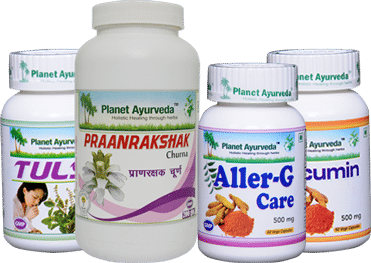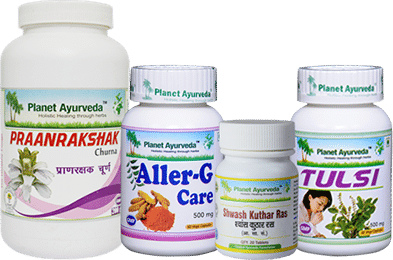Allergy

Allergy implies to the hypersensitive response within the body to a matter or substance which is not much harmful but may cause immune reactions which in turn displays symptoms and ailment of allergy.
Types of Allergy
- Atopic or anaphylactic reactions
- Cyotoxic reactions
- Immune complex reactions
- Delayed or cell mediated immune reactions
Causes
During allergic response, immune system activates T cells and B cells which produces antibodies. The allergens damages the tissues and causes inflammation. T cells, B cells and Immunoglobulin E (IgE) is responsible for allergic reactions.
Symptoms
- Skin rashes, redness, itchiness
- Irritation
- Swelling
- Indigestion
- Nausea-vomiting
- Sneezing
7 Herbs for Allergy
- Turmeric Contains curcumin, which acts as a decongestant, helps to reduce allergy symptoms, and wards off cold. Turmeric is beneficial for hay fever, bronchitis, lung problems and allergies. Curcumin reduces the inflammation and swelling in the tissues of the sinuses.
- Butterbur is another alternative of antihistamine which is obtained from weed. It prevents the swelling by inhibiting leukotrine. The extract of butterbur root is very potent to treat allergies. It is effective for nasal symptoms as it contains antihistamine with no side-effect like sleepiness.
- Garlic contains quercetin whichis a plant based bioflavonoid with anti-inflammatory activity that normalizes mast cells and inhibits the histamine secretion. It acts as an antioxidant that destroys harmful free-radicals. Raw garlic is one of the safest and most popular remedy to prevent or relieve allergy.
- Stinging Nettle has antihistaminic action which evades off allergies without any side effects. The leaves are rich in carotene, quercetin and vitamin K. Quercetin blocks body’s ability to produce histamine. Freeze dried extract of stinging nettle leaf is very beneficial.
- Green Tea has a powerful antioxidant phytonutrient called epigallocatechin gallate (EGCG) which inhibits histamine and immunoglobulin E that are naturally-produced chemicals linked with uncomfortable allergy-symptoms. Since EGCG blocks their production, reduces allergy symptoms. Drink two to three cups of green tea daily.
- Licorice contains licoachalcone which has anti-tumor, antimicrobial and anti-inflammatory effects. It inhibits cellular activities that promote allergic reaction and has been found very effective to decrease skin inflammation.
- Tinospora Cordifolia is used in the treatment and management of allergy symptoms. It can help in eliminating nasal discharge, itching and sneezing which are most common symptoms of allergy. It also provides symptomatic relief in hay fever or allergic rhinitis.
Herbal Remedies for Allergy
Asthma
Is a complex and chronic ailment of airways which leads to hyper-reactivity and narrowing of airways due to swelling and inflammation that obstructs the air entry to and from the lungs.
Causes
- Family History of allergies
- Personal History of allergies
- Respiratory tract ailments
- Environmental Factors such as smoking, chemicals, second-hand smoke, tobacco, food.
- Heartburn
- Obesity
Symptoms
- Wheezing
- Breathlessness, drowsiness
- Chest tightness or chest pain
- Cough
- Fatigue
- Palpitation
Types
- Allergic Asthma is more common which develops in early childhood accompanied with allergies. It may go into remission in adulthood or may reappear later in some cases.
- Non Allergic Asthma mostly develops in adulthood and has no association with any kind of allergies. Women are very prone to non allergic asthma. Being a chronic condition, it is difficult to treat.
7 Herbs for Asthma
- Ginkgo Biloba is effective in managing asthma and allergy. It contains highly potent anti-inflammatory chemicals, seven antihistamines and ginkgolides which effectively relieves asthma attack. It relieves inflammation by destroying free radicals and allows better passage for oxygen into the lungs to make breathing easy.
- Sida Cordifolia has anti-inflammatory and decongestant effects and is traditionally used in asthma, bronchitis, heart diseases and nasal decongestion. The leaves, stem, seeds, and root of sida cordifolia contains medicinal properties.
- Ginger is a well-known remedy for asthma. It can help to reduce airway inflammation, inhibit airway contraction and may enhance the muscle relaxant effects of certain asthma drugs.
- Boswellia is an ayurvedic herb beneficial in treatment of asthma and lungs ailments and reduces the recurrence of acute asthma attack. Boswellia has been used as an asthma remedy for centuries in India.
- Arsley leaf helps to relieve coughing in asthma and acts as an expectorant to expel mucous trapped in the airways. It relieves tightness in the muscles of the chest and soothes the throat and relieves cough.
- Mullein helps to relax acute asthmatic spasms and constriction in the airways. It relieves coughing, upper respiratory conditions, shortness of breath and wheezing.
- Reishi mushroom is a potent anti-inflammatory that strengthens the lungs. It is an immune booster and reduces swelling in the airways.


